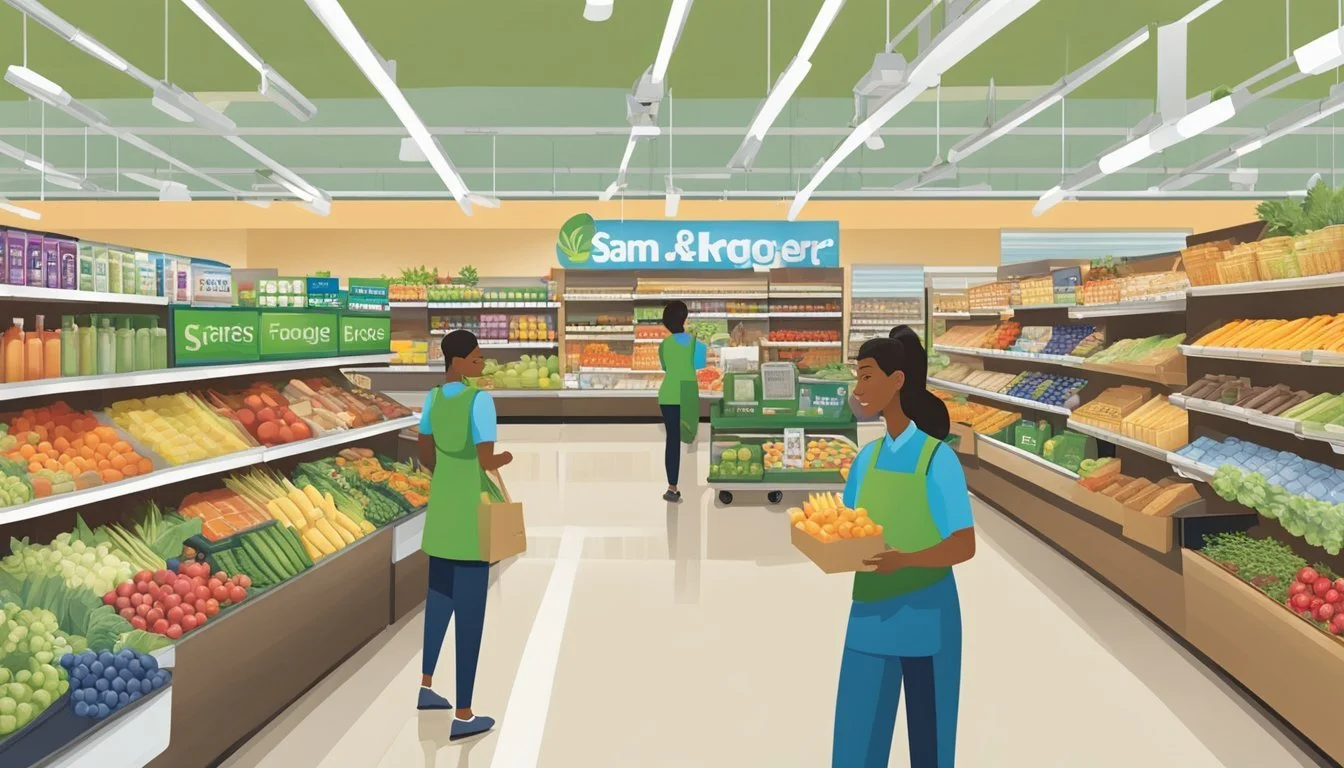Kroger vs Sam's Club
Comparing Shopping Experience, Prices, and Selection
Part of Our Grocery Store Guide with Details on Kroger and Sam's Club
Choosing between Kroger and Sam's Club for grocery shopping demands a comparison of two contrasting retail experiences. Kroger, one of the largest supermarket chains in the United States, offers a wide variety of products, from fresh produce to pharmacy services, catering to everyday consumer needs with a focus on convenience and quality. Its commitment to customer satisfaction is evident in its diverse lineup of house brands and organic options.
On the other hand, Sam's Club, a members-only warehouse club, provides bulk products at competitive prices, potentially offering savings for families and businesses. Their model is based on volume sales, reducing unit costs, which can translate into long-term savings for the shopper willing to buy in larger quantities. However, the membership fee, which is a prerequisite to shop, adds an additional factor to consider when determining the overall value and convenience.
In navigating the decision between Kroger and Sam's Club, consumers weigh factors such as product selection, pricing, shopping experience, and additional benefits that each store provides. This objective evaluation aims to determine which retailer offers a more advantageous shopping experience that aligns with the needs and preferences of the contemporary shopper.
History and Background
Established retail giants Kroger and Sam's Club each have storied beginnings that have shaped the landscape of American grocery shopping. They both hold significant places in history with their unique business models and expansion over the years.
Kroger: A Brief History
The Kroger company began in 1883 when Bernard H. Kroger invested his entire life savings of $372 to open a grocery store in Cincinnati, Ohio. His commitment to quality was encapsulated in his motto—"Be particular. Never sell anything you would not want yourself." Starting as the Great Western Tea Company, it evolved into one of the United States' first chain store operations.
By 1902, Kroger saw remarkable growth with 40 stores and a factory, leading to the formation of The Kroger Grocery and Baking Company. Over the decades, the store count peaked at 5,575 stores in 1929. Eventually, in 1946, a more succinct name was adopted—The Kroger Co.
Sam's Club: Origins and Evolution
Sam's Club was a vision of Sam Walton, an extraordinary retailer who had successfully launched Wal-Mart Stores, Inc. He began his retail journey with a series of five-and-dimes in Arkansas during the 1960s. By the 1970s, he had almost 300 stores across the South. Walton opened the first Sam's Club in 1983 to serve small businesses and individual shoppers in a warehouse club format.
From its inception, Sam's Club was part of the larger Wal-Mart Stores, Inc., which itself was incorporated in 1971 and became a billion-dollar enterprise by the year 1980. With its emphasis on bulk sales and membership-based shopping, Sam's Club has grown into a key player in the wholesale retail market.
Store Locations and Accessibility
When choosing between Kroger and Sam's Club, the availability of store locations and the accessibility provided by each play a crucial role in customer convenience.
Kroger's National Presence
Kroger operates a vast network of supermarkets across the United States. Notably present in regional markets, Kroger's strength lies in its accessibility with a large number of stores in various states. Kroger is recognized for its significant foothold, especially in Southern states, reflecting the brand's commitment to serving a broad customer base.
Sam's Club's Reach and Memberships
Sam's Club, a division of Walmart, offers a different approach to grocery shopping through its membership-based warehouse clubs. With close to 600 locations spread across 45 states, including Puerto Rico, Sam's Club's reach is substantial. However, its access is exclusive to members, distinguishing it from traditional supermarkets like Kroger. This membership model contributes to a sense of exclusivity and may offer a different shopping experience compared to more traditional grocery stores.
Price Comparison
In the realm of grocery shopping, price is often the most significant factor influencing consumer choice. This section breaks down the pricing strategies of Kroger and Sam's Club, providing insight into where shoppers might find better value.
Pricing Strategies at Kroger
Kroger employs a variety of pricing strategies aimed at providing value to their customers. Their approach includes frequent sales and deals on a wide range of products from name brands to their own private label. Kroger also offers a loyalty program which can lead to significant savings at the checkout through personalized deals and the accumulation of fuel points.
Sales: Regular weekly sales.
Loyalty Program: Savings with Kroger Plus Card.
Private Label: Competitive pricing with Kroger's brands.
Sam's Club Pricing: Bulk Savings
Sam's Club, contrasting with traditional retailers like Kroger, bases its pricing on a bulk-buying model. This often results in lower per-unit costs but requires purchasing larger quantities. The wholesale approach is particularly advantageous for businesses and families looking to stock up, offering significant savings over time.
Membership Model: Requires annual fee for access to deals.
Bulk Pricing: Lower per-unit prices on bulk items.
Limited Selection: Focuses on popular products with high turnover.
Product Range and Quality
Assessing Kroger versus Sam's Club in terms of product range and quality reveals distinct differences in merchandise diversity and selection. Each store offers a unique shopping experience tailored to different consumer needs.
Kroger's Merchandise Diversity
Kroger boasts an impressive variety of items, with an estimated 30,000 stock keeping units (SKUs) available to shoppers. They offer fresh produce, quality meats including pork, beef, and veal, and a wide range of organic options. Customers can expect to find even the most specific grocery staples at Kroger.
Produce: A vast selection of fruits and vegetables, both conventional and organic.
Meat: High-quality options from standard cuts to specialty items.
Staples: An extensive variety to cater to everyday needs.
Quality and Selection at Sam's Club
While Sam's Club offers a more limited SKU range of roughly 4,000 to 5,000, the focus is on bulk items and larger quantities. This can lead to savings for certain consumers, but it may also limit the selection for others. Despite a smaller variety, Sam's Club is committed to quality, especially noted in their meat selections which are available in bulk.
Quality: Bulk purchases often come from trusted sources to maintain quality.
Selection: More focused with an emphasis on larger packs suitable for families or businesses.
Staples: Available in bulk, providing value for larger households or businesses.
In summary, Kroger offers a more diverse range in terms of SKU count, which includes a broad selection of organic and specialty items. Sam's Club, on the other hand, prioritizes bulk items with a trimmed selection, often orienting towards households seeking to purchase larger quantities.
Brand and Store-Owned Products
Both Kroger and Sam's Club offer a variety of brand and store-owned products that cater to a range of consumer needs, reflecting their commitment to value and quality.
Kroger's Private Label Offerings
Kroger's portfolio includes an extensive range of store brands that rival national brands in quality and value. Kroger brand products cover various categories, from pantry staples to organic options.
Simple Truth: An organic and natural brand that meets a demand for health-conscious options.
Private Selection: A premium brand offering gourmet-inspired choices.
Kroger Brand: The core store brand that includes everyday items at an economical price point.
Kroger continually develops its private label selection, which now boasts thousands of products, making it a comprehensive grocery store brand.
Exclusive Brands at Sam's Club
Sam's Club, owned by Walmart Inc., competes with its exclusive brands that provide members with quality products at a bulk-purchase value.
Member's Mark: Sam's Club's primary store brand offers everything from fresh food to apparel, representing quality and value.
Daily Chef: Targeted at a culinary audience, it includes restaurant-quality food supplies.
The store brand emphasis at Sam's Club is on bulk items, focusing on delivering larger quantities which often result in cost savings for its members.
Both Kroger and Sam's Club leverage their store brands as a key retail strategy to differentiate themselves in the grocery store segment, encouraging brand loyalty and shopper satisfaction.
Customer Experience
When comparing Kroger and Sam's Club, customer experience may be the deciding factor for many shoppers. This encompasses the overall ambiance of the stores, the convenience offered, the level of customer service, and the cleanliness maintained throughout the shopping journey.
Shopping Ambiance at Kroger
Kroger is known for its traditional grocery store format that prioritizes a convenient and familiar shopping experience. Cleanliness is a hallmark of Kroger's customer commitment, ensuring shoppers can navigate through well-maintained aisles. Customer service is available for assistance, ensuring a reliable experience for those who value personal interaction and readily available help. The store layout is designed with convenience in mind, allowing customers to find items without unnecessary hassle.
The Sam's Club Shopping Environment
In contrast, Sam's Club offers a unique experience due to its membership-based warehouse style. The expansive store layout provides an extensive range of bulk goods, catering to those looking for value in larger quantities. The sense of convenience here is different from Kroger, as the benefit comes from stock-up trips compared to frequent, smaller visits. Cleanliness and organization are maintained well, considering the larger volume of products and customers. Sam's Club provides ample customer service, though the environment is more self-service oriented, with an emphasis on efficiency and bulk purchases.
Sustainability and Social Responsibility
In the landscape of grocery retail, both Kroger and Sam's Club have taken unique approaches to sustainability and social responsibility.
Kroger's Community Involvement
Kroger's sustainability and social responsibility efforts have been encapsulated in their "Thriving Together" strategy, which emphasizes a triple bottom line approach: people, planet, and products. They focus on sustainable sourcing -- including animal welfare -- and reducing the company's carbon footprint. Kroger's 2023 Environmental, Social & Governance (ESG) Report outlines their achievements, setting benchmarks for environmental stewardship and community engagement.
The grocery chain actively supports local communities through initiatives that contribute to food security and nutrition. Their Zero Hunger | Zero Waste plan, for example, is a bold initiative aimed at ending hunger in the communities they serve and eliminating waste across the company by 2025.
Sam's Club: A Commitment to Sustainability
Sam's Club, owned by Walmart Inc., prioritizes sustainability across its vast network of warehouse stores. Their sustainability endeavors are woven into the company's operations, with measures to reduce waste, enhance energy efficiency, and offer sustainable product options. The focus is on creating value not just for the business, but also for society and the environment.
Their efforts include supporting farmers and sustainable agriculture practices, actively working on reducing greenhouse gas emissions, and imposing guidelines for responsible sourcing. Sam's Club demonstrates its commitment to social responsibility by engaging in philanthropic activities, including grants and donations to causes that align with the company's core values.
Both Kroger and Sam's Club recognize the importance of sustainability and social responsibility within the dynamic retail grocery market. They have each implemented detailed strategies and programs to address these critical areas, aiming to foster positive environmental and societal impacts.
Online Shopping and Digital Services
In the realm of grocery shopping, online convenience and digital services are pivotal factors for modern consumers. Kroger and Sam's Club both provide robust online platforms designed to cater to the growing demand for digital grocery services. Below, we examine the specific online features and digital services offered by these two grocery giants.
Kroger's Online Marketplace
Kroger offers a comprehensive online marketplace for its customers, emphasizing convenience through easy browsing and ordering of their grocery selection. Customers can access Kroger's online services through the company's website or the mobile app. The digital platform provides:
A variety of groceries and household items
The option for delivery or in-store pickup
Exclusive online promotions and digital coupons
Through their online marketplace, Kroger maintains a commitment to:
Personalized shopping experiences
Frequent inventory updates
A membership system that offers additional savings and benefits
Sam's Club Digital Integration
Sam’s Club, owned by Walmart Inc., has integrated digital shopping into its business model effectively, appealing to members who value bulk purchases and convenience. The unique value proposition as part of the club’s membership includes:
Access to their Member Access Platform (MAP) retail media network
Estimated US grocery ecommerce sales of $5.80 billion for the current year.
Furthermore, Sam's Club utilizes the digital platform to:
Offer convenient pickup and delivery services
Provide competitive pricing exclusive to members
Both companies are investing heavily in the user experience to make online grocery shopping as seamless and personalized as possible.
Conclusion
Choosing between Kroger and Sam's Club for grocery shopping depends largely on the shopper's priorities. Kroger offers a vast selection with approximately 30,000 stock-keeping units, providing a variety of choices for everyday needs. This wide range of products caters to the individual shopper's preferences and dietary requirements. Regular supermarket-goers might find Kroger more suitable for complete grocery shopping trips.
Sam's Club, conversely, is known for its bulk offerings and limited SKU range (4,000 to 5,000). It's ideal for those seeking to stock up and save on larger quantities of items, although this may entail larger upfront purchases. Membership fees at Sam's Club are a consideration, but for those who buy in bulk, the savings can outweigh the cost.
In terms of savings, Sam's Club might offer better value on bulk items, while Kroger could present more promotional deals across a broader range of products. Both stores have their own brand lines that promise savings, with Sam's Club particularly noted for larger package sizes.
Aspect Kroger Sam's Club Product Variety Extensive Limited Package Sizes Individual and family-sized Bulk Membership Fee No Yes Savings Promotional deals, store brands Bulk pricing, store brands
Ultimately, a shopper's individual needs dictate the better choice. Kroger suits those who value variety and prefer not to buy in bulk. Sam's Club appeals to those who seek to maximize their budget for larger households or businesses and are comfortable with a warehouse shopping experience.








